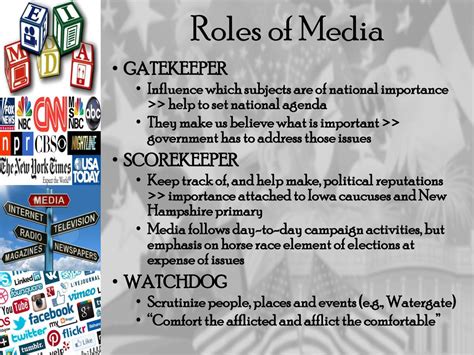In the realm of mass communication, the media plays a crucial role in shaping public opinion and facilitating political discourse. This role is often referred to as the “media gatekeeper” function.

Understanding the Media Gatekeeper Theory
The media gatekeeper theory proposes that the media acts as a filter between the public and the vast array of information available in the world. This filter is necessary to distill the overwhelming amount of news and commentary into a manageable and coherent narrative for public consumption.
Media outlets, including newspapers, television stations, and online platforms, decide which stories to cover, which perspectives to emphasize, and which facts to highlight. This process of selection and filtering significantly influences the information that the public receives and, ultimately, their understanding of current events and political issues.
Functions of Media Gatekeepers
As gatekeepers, the media performs several key functions:
- Selection: Choosing which news stories and issues to cover and which ones to ignore.
- Interpretation: Framing stories according to a particular perspective or narrative.
- Amplification: Deciding which voices and perspectives to amplify and which ones to marginalize.
- Agenda Setting: Shaping public opinion by determining which issues receive attention and which ones are buried.
Factors Influencing Media Gatekeeping
The factors that influence media gatekeeping decisions are complex and include:
- Ownership and Funding: The financial structure and ownership of media outlets can influence their coverage.
- Political Pressure: Governments and other political actors may attempt to influence media coverage through regulation or incentives.
- Journalistic Norms: Ethical guidelines and professional standards guide journalists in their reporting.
- Audience Preferences: Media outlets seek to cater to the interests of their intended audience.
- Technological Advancements: The rise of social media and other digital platforms has challenged traditional gatekeeper models.
Impact of Media Gatekeeping
The media’s gatekeeper role has significant implications for democracy and public discourse:
- Bias and Distortion: Gatekeeping can lead to bias and distortion in news coverage, potentially shaping public opinion in unhealthy ways.
- Marginalization of Voices: Gatekeeping decisions can silence or marginalize minority perspectives, limiting the diversity of information available to the public.
- Influence on Public Policy: By setting the agenda and framing issues, the media can influence policy debates and decision-making.
- Accountability and Transparency: Gatekeepers play a critical role in holding public officials accountable and ensuring transparency in governance.
Challenges to Media Gatekeeping
In the digital age, the traditional media gatekeeping model is facing numerous challenges:
- Information Overload: The abundance of information available online has made it difficult for gatekeepers to control the flow of information.
- Social Media: Social media platforms allow individuals to bypass traditional gatekeepers and share their own perspectives.
- Misinformation and Disinformation: The spread of false and misleading information online poses a challenge to media gatekeepers to discern the truth.
Strategies for Responsible Media Gatekeeping
To mitigate the challenges posed by media gatekeeping, several strategies are essential:
- Diverse Ownership: Promoting diverse ownership of media outlets can reduce bias and increase the representation of different perspectives.
- Transparency and Accountability: Media outlets should be transparent about their gatekeeping decisions and provide opportunities for public feedback.
- Media Literacy Education: Educating the public on media literacy skills can empower them to critically evaluate media content and resist manipulation.
- Collaboration and Fact-Checking: Media outlets should collaborate with independent fact-checkers to verify information and ensure accuracy.
Conclusion
The media plays a pivotal role as gatekeepers, shaping public opinion, facilitating political discourse, and holding public officials accountable. Understanding the gatekeeper function is crucial for evaluating the quality and trustworthiness of media coverage, promoting informed decision-making, and ensuring the health of our democracy.
